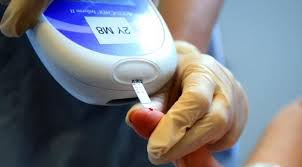Source: stroudnewsandjournal.co.uk
Tens of thousands of people in Gloucestershire are at risk of developing Type 2 diabetes – the highest number on record.
NHS chief executive Simon Stevens says “our bulging waistlines” mean 2 million people across England are now in danger of suffering from the “largely preventable” disease.
NHS Digital data shows that 36,115 people registered with a GP in the NHS Gloucestershire CCG area last year had non-diabetic hyperglycaemia.
Those with NDH have high blood sugar levels, and are at greater risk of developing Type 2 diabetes.
The figures cover those registered at a GP practice who participated in the National Diabetes Audit, which aims to improve services for the condition, between January and September last year.
When the NHS first published the figures for those with NDH in 2017-18, there were 25,950 in the NHS Gloucestershire CCG area.
Across England, almost 2 million people were flagged as having it last year – the highest number on record and well above the 1.3 million recorded in 2017-18.
NHS England declined to comment on the exact reasons behind the sharp increase.
Referring to the latest figures, Mr Stevens said: “Our bulging waistlines mean 2 million people are now at risk of joining the expanding ranks of those living with largely preventable Type 2 diabetes.”
He said the NHS’s diabetes prevention programme was helping people take control of their own health, adding: “But unless many more of us make a change, obesity-related illnesses will end up costing hundreds of thousands more lives and billions of pounds in higher treatment costs.”
In Gloucestershire, 3.1% of those recorded as having non-diabetic hyperglycaemia were under 40 – below the average of 5.3% across the country.
Jonathan Valabhji, the NHS’s national clinical director for obesity and diabetes, said the “stark figures show it is wrong to think that the obesity and diabetes crisis is limited to those in middle and old age”.
According to NHS England, around nine in 10 people with diabetes have Type 2, and there were more than a million obesity diagnoses in hospital admissions last year.
Projections show the growing number of people with diabetes could result in nearly 39,000 extra people suffering a heart attack in 2035, and more than 50,000 experiencing a stroke, the health service added.
Chris Askew, chief executive at Diabetes UK, said: “The record number of people at high risk of developing Type 2 diabetes demonstrates the need for urgent action to stop its rapid growth.
“More than half of all cases of Type 2 diabetes − and the devastating complications it can lead to − could be prevented or delayed by supporting people to reduce their risk by losing weight where appropriate, eating healthy food and being more active.”
